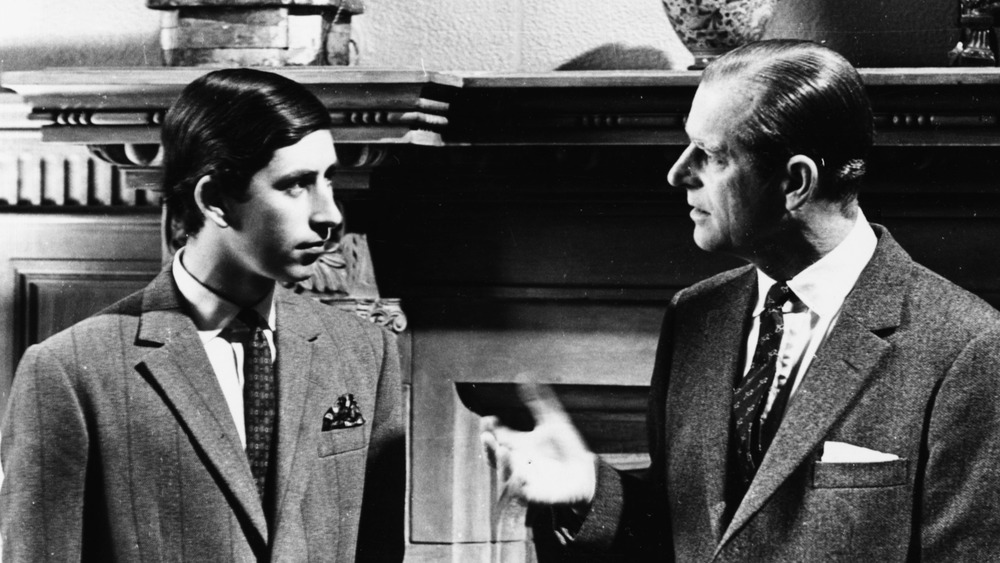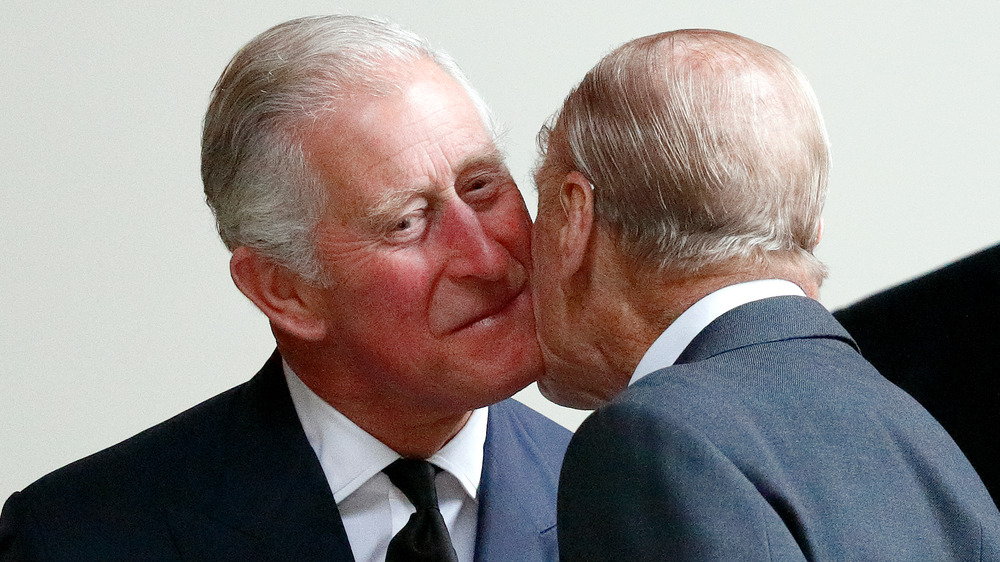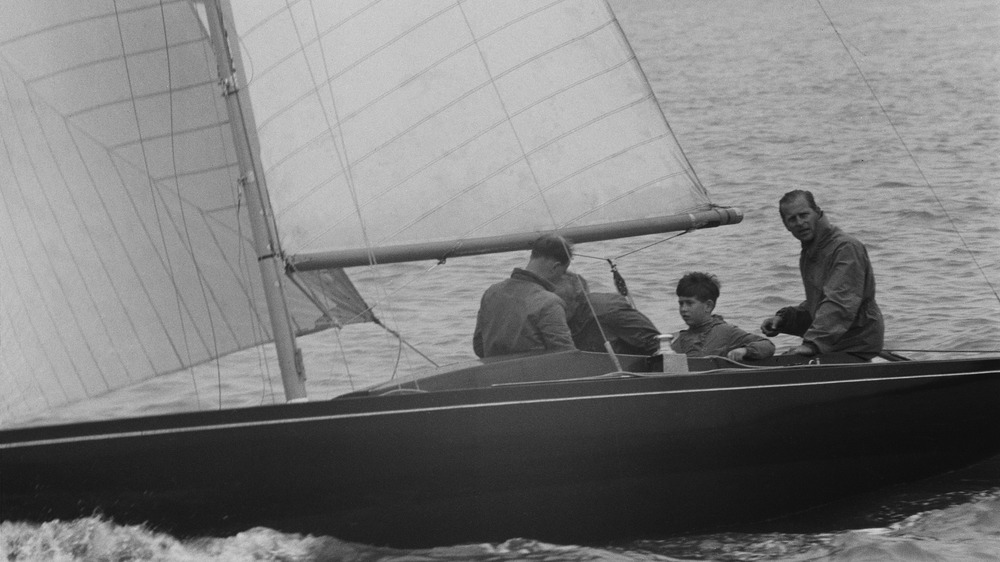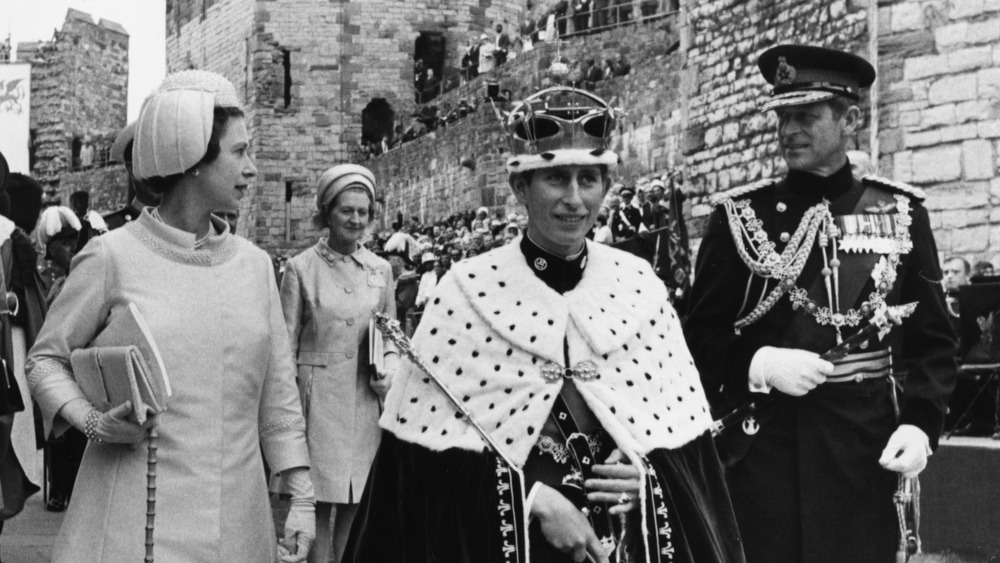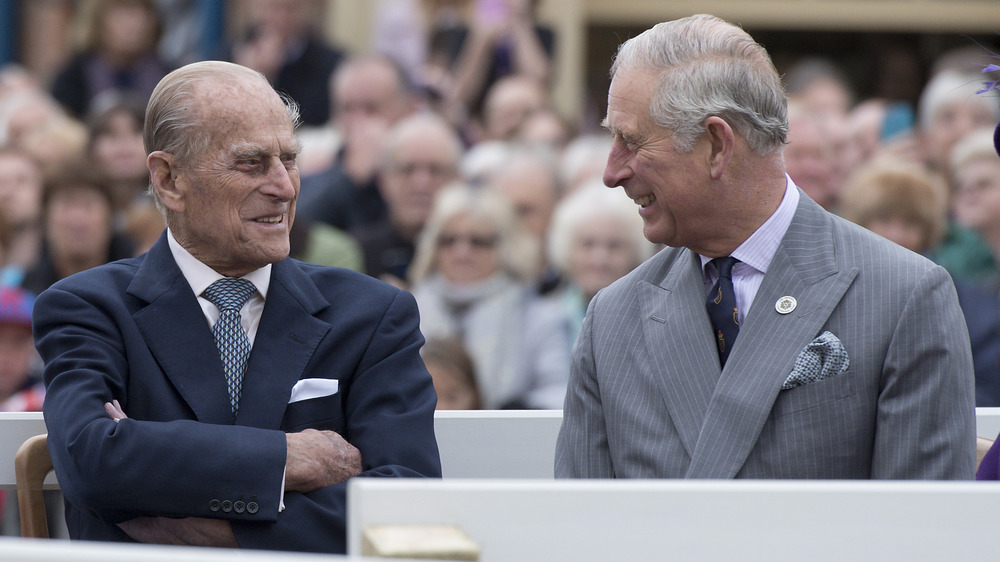Body Language Expert Reveals How Prince Philip Really Feels About Prince Charles
Prince Charles' relationship with his father has definitely changed over the years. From his early days at Buckingham Palace to his marriage to Princess Diana, and later life with his former mistress, Camilla Parker-Bowles, this father-son pair shows an interesting dynamic. The List spoke with body language expert and life coach Nicole Moore about her take on the royal duo's relationship throughout their lives.
While popular shows like The Crown showcase their relationship as cold and old-fashioned, the father-son pair may have more affectionate moments than many of their detractors realize. While most of these likely took place during Charles' early years, Prince Phillip did appear to be a doting father when his son was a child. But, as the pressures grow and duty calls, this warmth appears to freeze over. Analyzing clips from throughout the Prince's life, Moore shares her thoughts on the state of their relationship from the time Prince Charles was born through his second marriage.
Prince Phillip showed genuine affection to Prince Charles when he was very little
While the Brits don't strike many Americans as openly warm, Prince Phillip's early treatment of his son proved much more affectionate than many think. In a video clip from Prince Charles' early days as an infant, his father makes physical contact with him on more than one occasion. Moore weighs in, saying, "In this clip of Prince Charles when he was just a baby, Prince Phillip appears warm and doting toward his son. He affectionately puts his hand on his son's cheek and smiles at him."
The boy who would be king did have an obviously unconventional upbringing inside the palace walls, but it appears that his father showed the same excitement as any other new parent. "From his body language it's clear that Phillip enjoyed Charles when he was a small baby. Perhaps it was easier for Phillip when Charles had no ability to stand up to him or disobey," Moore adds.
As the years went on, though, whatever warmth that Prince Charles appeared to receive from his father appears to have cooled. In 1962, when starting a new school, his father accompanied him to his first day. Clearly nervous, Prince Charles exits the car and anxiously looks for his father amongst all of the commotion upon his arrival, a clip shows. "In a clip of Prince Charles beginning a new school in 1962, you can clearly see that as Charles got older, Prince Phillip took a more hands-off approach," Moore says.
Prince Philip left Prince Charles to fend for himself as he grew
"Phillip exits the car first and as Charles exits on the other side, you can see that for a split second, he looks over to see where his father is, almost as if he's searching for reassurance, but his father was already off greeting people," she continues. "Prince Charles then signs for a split second but quickly turns his head up, and begins walking toward the front of the car almost in an 'I've got this' manner."
At this point, Charles is clearly on his own. Even as his son shows signs of nerves, as most children do on their first day at a new school, his father's lack of reassurance exhibits a change in their relationship. "What's interesting is that Phillip never once looked back to see if Charles got out of the car or to check on him. Presumably, this was a big day for Charles with starting a new school, but in the entire clip, Philip displays no emotion or care toward him. There's no reassuring father energy here. It's all business and duty," she says.
Towards the end of the clip, Prince Charles shows how distant the relationship has become, standing far away from his father on an unnerving occasion. "He's not leaning on him at all for emotional support," More explains. "Their body language is clear: Prince Charles, even at a young age, was trained to rely on himself."
The royals' relationship continued to get colder as Prince Charles grew up
From that point on, the father-son relationship seems to be one of duty rather than affection. A video from Charles' later years with his younger siblings underpins a cold series of interactions between the pair. With two much younger brothers, Prince Charles looks every bit the uncomfortable, left-out older sibling. Prince Phillip barely looks his way in the video. At this point, his son is no longer a child and will soon become the Prince of Wales.
"You'll see in this clip that even though Prince Charles and Prince Phillip are standing next to each other, they don't look at each other once," Moore notes. "Toward the end of the clip, Prince Charles is walking awkwardly behind the family, with a lot of space in between them, his body language indicating that perhaps he felt like a bit of an outsider or a loner in his family."
The royal family had very little time for coddling or connection — especially with the future king.
Prince Charles' wedding to Camilla shows a turning point
Even though it took awhile for the Queen to publicly acknowledge her son's relationship with his former mistress, Camilla Parker-Bowles, their wedding day shows a softer side of Prince Phillip. The pair's wedding reels highlight a happy, smiling Queen Elizabeth and Prince Phillip that look on while their son marries the woman he has loved for decades. With Prince William as his best man, Prince Charles looks every bit the part of the happy husband.
As for his father, it appears that their relationship has softened over the years. "In a clip of Prince Charle's wedding to Camilla, you can clearly see that Prince Phillip is smiling and happy as he watches the couple," Moore notes. "At this point, both father and son are older and it's possible that as the years passed, the tension between the two faded and more mutual respect grew."
Through the ups and downs that many father-son relationships go through, which were clearly amplified by the pressures of being members of the royal family, Prince Charles and his father seem to have come to a place of peace later in their lives.
